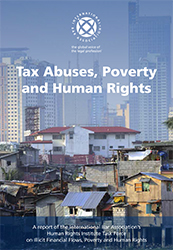Prepared for the International Bar Association’s Human Rights Institute Task Force on Illicit Financial Flows, Poverty and Human Rights (Stephen B Cohen, Lloyd Lipsett, Sternford Moyo, Robin Palmer, Thomas Pogge (Chair), Shirley Pouget and Celia Wells), the report analyses how tax abuses deprive governments of the resources needed to combat poverty and fulfil their human rights obligations. Tax abuses (that is tax practises contrary to the letter or spirit of international and domestic tax laws and policies) have a significant negative impact on the realisation of human rights in developing countries. Profits flowing out of developing countries deprive governments of the resources to alleviate poverty and uphold international human rights standards, in particular ESCR. The Report also finds that actions of states that encourage or facilitate tax abuses, or that deliberately frustrate the efforts of other states to counter tax abuses, could constitute a violation of their international human rights obligations, particularly with respect to economic, social and cultural rights (ESCR).
The legal profession has an important role to play in confronting the negative effects of tax abuses on human rights. Lawyers have a duty to balance their obligation to their client’s interests with their obligations to uphold human rights and the rule of law.
Thomas Pogge, Leitner Professor of Philosophy and International Affairs at Yale University, USA and Task Force Chair said, ‘The fact that sophisticated tax planning strategies are technically legal is no longer a justification for their use. The impact of tax abuses, facilitated by secrecy jurisdictions, on global poverty is tremendous. The international community has not only a legal obligation but also a moral duty to ensure that states use the maximum resources available to fulfil the civil, political, economic and social rights of citizens’.
The 264-page Report, based on extensive consultation over an 18-month period, highlights tax abuses as a pressing human rights issue and delivers recommendations for states, businesses and the legal profession. The Report urges:
- States to implement international standards of transparency and information exchange in tax matters effectively;
- Businesses to undertake due diligence measures and impact assessment of all operations, including with respect to tax planning strategies; and
- Lawyers to balance their obligations to defend clients’ interest with the responsibilities to uphold human rights in their practice, including with respect to tax planning strategies.
Speaking specifically on the role of lawyers to counter tax abuses, Sternford Moyo, IBAHRI Co-Chair and Task Force Member commented, ‘The legal profession has an important role to play in confronting the negative effects of tax abuses on human rights. Lawyers have a duty to balance their obligation to their client’s interests with their obligations to uphold human rights and the rule of law.’
